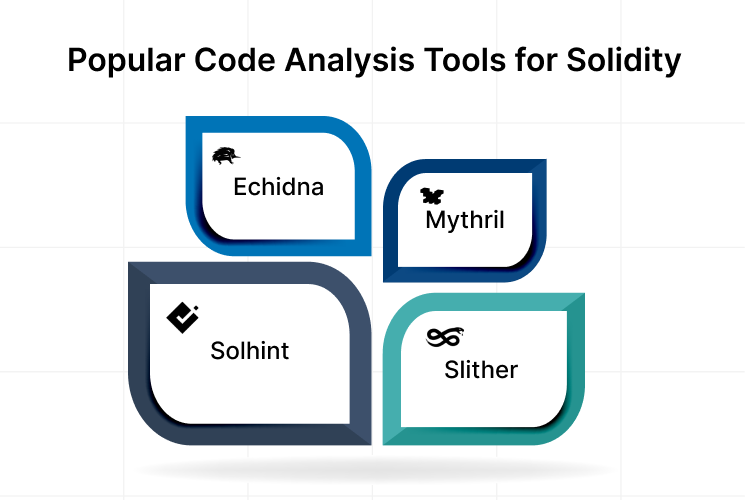-
Smart contracts are powerful tools that can help businesses to automate their processes. However, smart contract development is only effective if these contracts are properly audited. Vulnerabilities in smart contracts can lead to substantial financial loss. So, there arises the need for rigorous code analysis tools. Code analysis is a thorough examination of a program's source code to find bugs, security flaws, and other vulnerabilities. Analysts can either do this process manually or utilize tools. This blog gives a comprehensive guide for code analysis tools for Solidity smart contracts.
Code Analysis Tools
Code analysis tools for Solidity, the programming language specifically designed for smart contracts on the Ethereum blockchain, play a crucial role in identifying potential security flaws, bugs, and design flaws in smart contract code. These tools help developers ensure the security, reliability, and overall quality of their smart contracts, mitigating risks and protecting user funds.
Suggested Read | Why Use Solidity for Smart Contracts Development
Types of Code Analysis Tools for Solidity
Code analysis tools for Solidity can be categorized into two broad types:
Static Analysis Tools
Static analysis tools examine the source code of smart contracts without executing them. They scan the code for potential vulnerabilities, such as reentrancy attacks, integer overflows, and logic errors. Static analysis tools are particularly useful for identifying early-stage vulnerabilities and code inconsistencies.
Dynamic Analysis Tools
Dynamic analysis tools execute smart contracts with specially crafted inputs to uncover unexpected behavior and uncover vulnerabilities. They can be particularly effective at finding edge-case scenarios and vulnerabilities that may not be detected by static analysis.
Explore More | Why Choose Solidity for Creating Ethereum Smart Contracts
Benefits of Using Code Analysis Tools for Solidity
Employing code analysis tools for Solidity offers several distinct benefits:
Enhanced Security
Code analysis tools help identify and remediate security vulnerabilities, minimizing the risk of hacks and exploits that could compromise user funds and disrupt the operation of DeFi applications.
Streamlined Development Process
Code analysis tools can be integrated into the development workflow, providing continuous feedback and enabling developers to address issues early on, saving time and effort in the long run.
Improved Code Quality
Code analysis tools promote code quality by detecting bugs, design flaws, and inefficient code patterns. It leads to more robust, maintainable, and performant smart contracts.
Check It Out | Analyzing Solidity and Vyper for Smart Contracts Programming
Popular Code Analysis Tools for Solidity
Several popular code analysis tools are available for Solidity smart contracts, each with its unique features and strengths:

Echidna
Echidna is a property-based fuzzer that generates random inputs to test smart contracts. It uncovers unexpected behavior and potential vulnerabilities.
Mythril
Mythril is a symbolic execution tool that analyzes smart contracts. It executes them with symbolic inputs. It uncovers vulnerabilities and edge-case scenarios.
Solhint
Solhint is a linter that enforces coding style guidelines and best practices. It improves code readability and maintainability.
Slither
Slither is a static analysis tool that detects a wide range of vulnerabilities. These vulnerabilities include reentrancy attacks, integer overflows, and logic errors.
Also, Discover | A Definitive Guide to Smart Contract Development Tools
Integrating Code Analysis Tools into the Development Process
Consider the following strategies to effectively utilize code analysis tools:
Early Integration
You can integrate code analysis tools into the early stages of development. It helps identify and address vulnerabilities as early as possible.
Continuous Analysis
You can use code analysis tools as part of a continuous integration (CI) pipeline. It automates vulnerability detection and ensures code quality throughout the development cycle.
Thorough Review
You can carefully review the findings of code analysis tools. It will help you understand the root cause of identified issues and implement appropriate fixes.
You May Also Like | Ethereum Smart Contract Development | Discovering the Potential
Conclusion
Code analysis tools for Solidity are indispensable assets for developers building secure, reliable, and high-quality smart contracts. You can minimize risks and provide security by integrating these tools into the development process and employing them effectively.
Interested in smart contract development? Connect with our smart contract developers to get started.

Our Offices
INDIA
Emaar Digital Greens, Sector 61,
Gurugram, Haryana
122011.
Welldone Tech Park,
Sector 48, Sohna road,
Gurugram, Haryana
122018.













